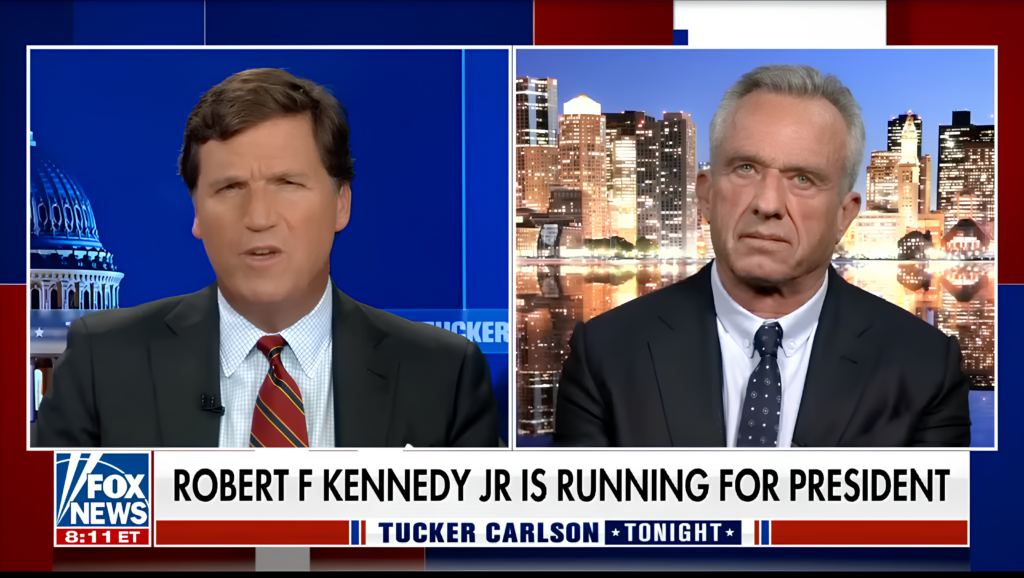Tucker Carlson Played Key Role in Trump-RFK Jr. Alliance

Trump and Kennedy Unite in Unexpected Political Alliance
In one of the most surprising political developments of the 2024 election cycle, former President Donald Trump and Robert F. Kennedy Jr. have joined forces following a near-assassination attempt on Trump in mid-July. This unlikely partnership began with a phone call from Calley Means, a health care entrepreneur advising Kennedy, who proposed a collaboration between the two men, drawing on the shared history of violence against the Kennedy family. The conversation marked the start of a series of intense discussions and negotiations, leading to Kennedy’s endorsement of Trump and the suspension of his independent presidential campaign, as detailed by The New York Times.
Negotiations Behind Closed Doors
The initial proposal for a Trump-Kennedy partnership was met with skepticism within Kennedy’s camp. While Kennedy initially rejected the idea of serving as Trump’s vice-presidential candidate, he later reconsidered and agreed to further discussions. These talks, which spanned over six weeks, involved key figures such as Trump’s top advisor Susie Wiles, Kennedy’s campaign manager Amaryllis Fox, political commentator Tucker Carlson, and Donald Trump Jr. Despite internal resistance, particularly from Kennedy’s family members, the negotiations continued, driven by the potential political advantages for both sides.
Strategic Calculations
Both Trump and Kennedy saw potential benefits in their alliance. For Trump, bringing Kennedy into the fold meant neutralizing a potential threat to his voter base. Kennedy’s campaign, which had struggled with declining poll numbers, financial difficulties, and legal battles, found new life in the possibility of aligning with Trump. The partnership also promised to consolidate support among voters skeptical of public health mandates and mainstream political establishments.
However, the road to this alliance was not without its complications. Kennedy’s wife, actress Cheryl Hines, along with other close advisers, expressed serious concerns about Trump’s trustworthiness and the potential backlash from Kennedy’s core supporters. Additionally, there were strategic missteps, including a breach of privacy when a video of a private conversation between Trump and Kennedy was posted online by Kennedy’s son, leading to a temporary cooling of relations between the two camps.
Tucker Carlson’s Pivotal Role in the Trump-Kennedy Alliance
Tucker Carlson, a prominent political commentator known for his controversial viewpoints, played a critical role in facilitating the unexpected alliance between Donald Trump and Robert F. Kennedy Jr. His involvement began shortly after the assassination attempt on Trump in mid-July when Calley Means suggested connecting the two figures. Carlson, recognizing the potential for this alliance to reshape the 2024 election, eagerly facilitated the connection between Trump and Kennedy.
One of the key factors that drew Carlson and Kennedy together was their shared skepticism of vaccines, particularly the COVID-19 vaccines. Both Carlson and Kennedy have been vocal proponents of anti-vaccine narratives, a stance that has resonated with a segment of the American public distrustful of government and pharmaceutical companies. Carlson frequently provided Kennedy with a platform on his show to express these views, amplifying Kennedy’s message and bolstering his political influence. This common ground on public health issues laid the foundation for a deeper political alignment between the two.
In addition to their anti-vaccine positions, Carlson and Kennedy, along with Trump and his running mate J.D. Vance, share a controversial sympathy toward Russia. Carlson has been criticized for his pro-Russian commentary, often questioning U.S. involvement in Ukraine and expressing skepticism about the mainstream narrative surrounding Russia’s actions. Similarly, Kennedy has voiced concerns about the U.S. role in the Ukraine conflict, advocating for de-escalation and a reassessment of American foreign policy. Trump and Vance have also exhibited pro-Russian sympathies, with Trump frequently praising Vladimir Putin and Vance advocating for a more isolationist approach that aligns with Russian interests.
This convergence of views on both public health and foreign policy further cemented the Trump-Kennedy alliance, with Carlson playing a central role in bridging their respective campaigns. Carlson’s influence extended beyond media advocacy; he was instrumental in shaping the strategic decisions that led to Kennedy’s endorsement of Trump, recognizing that their shared narratives could unify a diverse voter base disillusioned with both the Democratic and Republican establishments.
Carlson’s involvement highlights the growing intersection of anti-establishment rhetoric, public health skepticism, and foreign policy realignment within certain segments of the American right. His ability to connect and align these influential figures underscores his significant impact on the current political landscape, particularly as the 2024 election approaches.
The Public Unveiling
Despite these challenges, the alliance was solidified in August when Kennedy appeared alongside Trump at a rally in Arizona, formally endorsing the former president. This public display of unity marked a turning point in the 2024 election, with both men pledging to work together to “defeat the corrupt political establishment.” Kennedy was subsequently appointed as an honorary co-chair of Trump’s transition team, positioning him to have significant influence over the administration’s policies if Trump wins the election.
While the long-term implications of this partnership remain to be seen, it has already reshaped the political landscape, with both supporters and critics closely watching how this alliance will impact the upcoming election and the future of American politics.

